Israeli Security Cabinet Votes To Shut Down Iran-Backed News Station
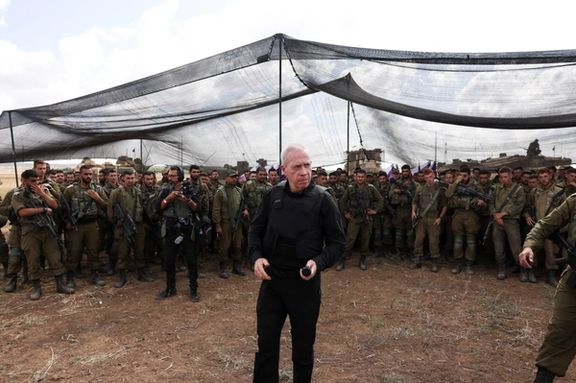
Israel's security cabinet voted Sunday to close the Lebanese Al Mayadeen satellite news station claiming it is the 'mouthpiece of Hezbollah'.

Israel's security cabinet voted Sunday to close the Lebanese Al Mayadeen satellite news station claiming it is the 'mouthpiece of Hezbollah'.
The decision follows emergency regulations passed last month, granting the government the authority to shutter foreign news outlets perceived to be detrimental to national security.
Communications Minister Shlomo Karhi initiated the request to cease Al Mayadeen's operations, asserting that the station's broadcasts "serves the interests of Israel's enemies". Amid the war in Gaza, Karhi justified the decision by stating, "Israel is at war on land, in the air, at sea, in cyberspace, on the airwaves, and in the public consciousness."
Thousands of Hamas militia invaded Israel on October 7, murdering at least 1,200 mostly civilians and capturing around 240 more as hostages. Deadly airstrikes by Israel have led to the death of thousands as the Jewish state vows to rid the Strip of the group proscribed by countries including the UK and US.
Initially targeting Al Jazeera as well, Karhi's efforts faced complications due to Qatar's involvement in negotiations to release the hostages held by Iran-backed Hamas in Gaza, which include babies and the elderly.
Defense Minister Yoav Gallant recommended the closure, emphasizing that steps were necessary to counter the network, which he described as the "mouthpiece of the Hezbollah terrorist organization," Iran's biggest Middle East proxy.
An immediate order has been issued to block Al Mayadeen's online operations in Israel, with a subsequent order to seize and confiscate its broadcasting equipment.
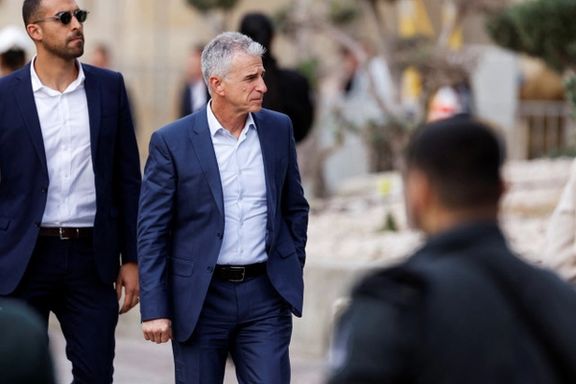
In a joint operation with Israel's spy agency, Mossad, Brazilian police have arrested a terror cell from the Lebanese Hezbollah planning Iran-backed attacks on Jewish targets.
Brazil's Federal Police said in a statement last week that they arrested two people, who they did not name, on terrorism charges in Sao Paulo. They also carried out search and seizure warrants in Sao Paulo, Brasilia and Minas Gerais states.
Mossad, the Israeli intelligence agency, issued a statement which said, "The Brazilian security services, together with the Mossad and ... additional international security and enforcement agencies, have foiled a terrorist attack in Brazil, which had been planned by the Hezbollah terrorist organization, directed and financed by the Iranian regime".
Mossad said the "terrorist cell ... was operated by Hezbollah in order to carry out an attack on Israeli and Jewish targets in Brazil."
In September, David Barnea, the head of Mossad, warned that the agency would strike "in the heart of Tehran" to find the people behind 27 Iranian attempts to hit Israeli and Jewish targets around the world over the last year.
Attacks had been foiled in Europe, Africa, southeast Asia and South America, he said, with others ongoing.
Hezbollah, originally established in Lebanon by Iran's Revolutionary Guards in 1982 to counter Israeli forces, holds the designation of a terrorist organization from Argentina, Britain, Canada, Germany, Honduras, the United States, and several Persian Gulf states aligned with the US.
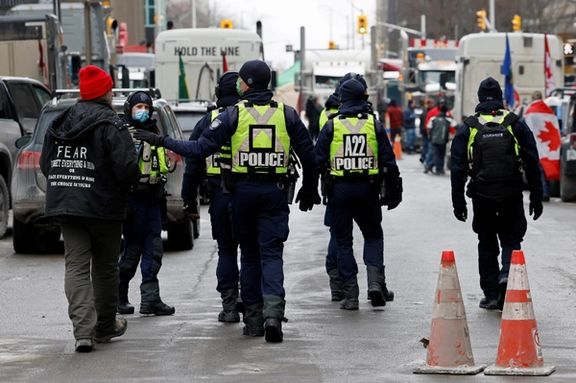
Mohammed Assadi, an Iranian from Ottawa, was apprehended near Toronto after reportedly being captured on video inciting hatred and expressing antisemitic views.
Ottawa police have filed charges against him for violating several bail conditions. Authorities are actively working to keep Assadi in custody while Toronto's hate crime unit conducts an investigation into the allegations.
Assadi made a virtual appearance in an Ottawa courtroom on Sunday, and the scheduling of his bail hearing is pending. In addition to the recent charges, he faces outstanding legal issues, including charges related to assault and breaking and entering, which are yet to be adjudicated.
Assadi is well known in the Iranian community after harassing members while wearing an IRGC Quds Force hat.
He has also harassed journalists working for the VOA while they were filing reports on Iran.
The incident comes at a time of heightened concern among Canadian police services over a surge in hate-motivated crimes, notably linked to the conflict between Israel and Hamas since October 7. The world has seen a global surge in antisemitism since Iran-backed Hamas invaded Israel when 1,200 mostly civilians were murdered and another 240 hostages taken to Gaza.
Israel's relentless retaliation has led to a humanitarian crisis in the coastal enclave as it vows to rid Gaza of the group proscribed by countries including Canada, the UK and US.
Earlier this month, Ottawa police reported several incidents, including graffiti, vandalism, hate mail, and threats targeting both the Jewish and Muslim communities. Responding to a similar increase in hate crime reports, Toronto police have expanded the size of their hate crime unit.

US and international forces in northeastern Syria were attacked with drones and rockets at least four times in the past 24 hours, a US military official said on Monday.
US forces came under attack three times on Sunday evening, including near the Al Omar Oil field and at a US base at al-Shaddadi, the official told Reuters. There were no casualties and only minor damage.
Multiple drones were fired at US forces at the Rumalyn Landing Zone on Monday morning, the official said. One drone was shot down but another damaged four tents, the official added.
The attacks came after the US carried out two air strikes on Sunday against facilities it said were used by Iran’s IRGC, its third set of strikes in Syria in as many weeks. However, these retaliatory strikes have failed to deter the aggression.
US troops have been attacked at least 40 times in Iraq and Syria since early October, when Hamas launched its terror attack on Israel. Statements, purportedly from militant groups, have said the assaults are in response to US support for Israel in the war in Gaza.
So far, at least 56 US personnel have suffered everything from minor wounds to traumatic brain injuries, though all have returned to duty, the Pentagon has said.
The US blames the attacks on groups backed by Iran - an assertion dismissed by Tehran which says the groups are acting on their own accord.
The United States has 900 troops in Syria and 2,500 more in neighbouring Iraq, whom it says are on a mission to advise and assist local forces trying to prevent a resurgence of Islamic State.
There is growing concern that the Israel-Hamas conflict could spread through the Middle East and turn US troops at isolated bases into targets.
Reporting by Reuters
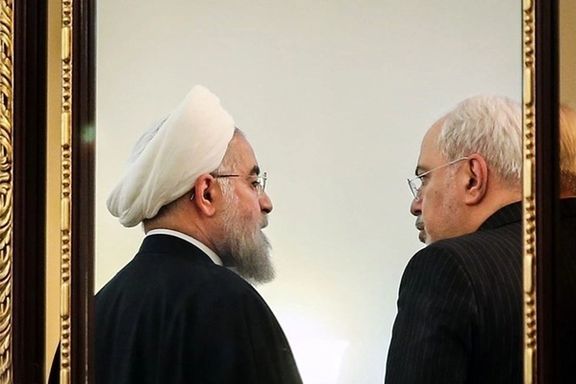
Iran's former foreign minister joined ex-president Hassan Rouhani to warn against Iran becoming involved in the Israel-Hamas war in Gaza.
Mohammad-Javad Zarif said the entry of Iran and Hezbollah into the ongoing conflict between Hamas and Israel only serves the interests of the Israeli government. “Israel is trying to drag the war outside its borders and involve the United States,” he added.
Zarif also highlighted Russia's historical alignment with Israel, noting that the Soviet Union was the first country to recognize Israel. He pointed out that two million Russian citizens currently reside in Israel. While acknowledging that the policies of Russia and China are relatively more balanced compared to the United States and Europe, Zarif stressed that neither Russia nor China supports the Palestinians.
Without going into details, Zarif revealed that a hardline group has in a letter to Supreme Leader Ali Khamenei pushed for dragging Iran into the war.
On Thursday, Hassan Rouhani, the ex-president of Iran, addressed the ongoing conflict in Gaza, warning that the regime's flaming of unrest is putting Iran at risk.
He emphasized the potential consequences of its being overly involved, directly or indirectly through its proxies, warning that "a mistake, a wrong decision, or an imprecise action could drag the flames of war towards us."
Growing concerns about the potential escalation of the Israel-Hamas conflict throughout the Middle East have prompted the United States to deploy additional air defenses, warships, and fighter aircraft to the region since Iran-backed Hamas invaded Israel on October 7. The deployment includes two aircraft carriers and involves the addition of thousands of troops.
Thousands of Hamas troops invaded Israel by air, land and sea, killing at least 1,200 mostly civilians and taking around 240 hostage. It has seen a relentless retaliation from Israel which has troops the deepest into Gaza since Hamas took over the strip in 2007, with airstrikes killing thousands in the densely populated coastal enclave.
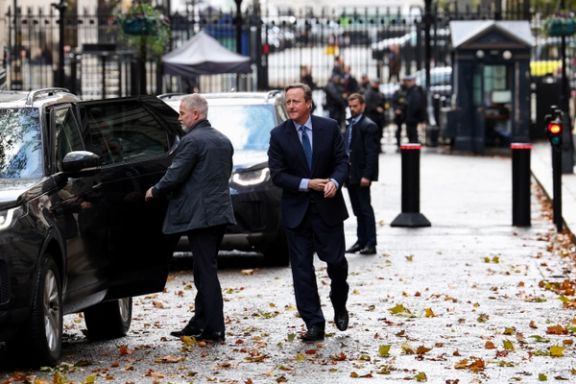
In a shock cabinet reshuffle, former PM David Cameron has been brought back into politics as the Conservative party's foreign secretary.
It came following the firing of home secretary Suella Braverman, as she was the most outspoken member of government to critizing the police for its handling of pro-Hamas protests in the UK’s streets.
The protests, partly supported by Iran, had brought hundreds of thousands of people to the UK’s streets, including across the British capital, leading to a wave of antisemitism and Islamist manifestations in Britain.
In a shock move, she has been replaced by foreign minister James Cleverly, with the role of foreign minister going to former PM David Cameron, who stepped down after the Brexit referendum in which the UK voted to leave the European Union.
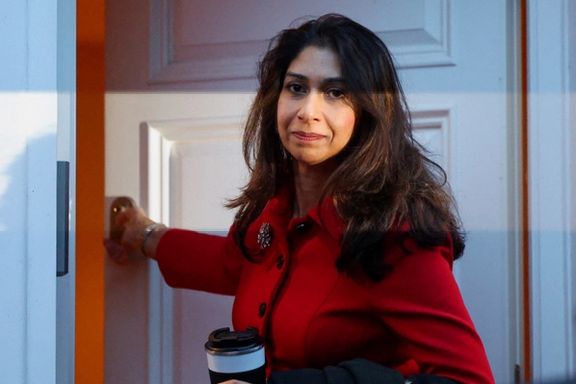
It was Cameron who during his time as the British PM between 2010-2016, reinstated relations with Iran. He met with President Hassan Rouhani at the UN headquarters in New York in 2014 in the first such meeting since the Iranian Revolution in 1979.
He was charged with reopening diplomatic ties which had been cut after Iranian regime loyalists stormed the British embassy in Tehran in 2011.
In 2013, the election of what appeared to be a more moderate Rouhani, replacing Mahmoud Ahmadinejad, paved the way for a thaw in ties. In 2014, the UK reopened its embassy.
The 2014 meeting focused on nuclear talks but also addressed the rising threat of the Islamic State group, which at the time had taken over much of Syria and Iraq.
A statement from the PM’s office at the time offered signs of progress, and said: “The PM and president acknowledged that there had been significant differences between their countries in the past, and agreed that we should seek to progressively improve our bilateral relationship.”
But almost a decade later, little has changed with Iran remaining one of the world's largest funders of terror. The PM office at the time had stated: “The prime minister and president noted the threat posed to the whole region by ISIS, and agreed that all states in the region must do more to cut off support for all terrorist groups, including financial support.”
Since then, in addition to being a state sponsor of terror, Iran has been declared by the UK as one of its biggest domestic threats with numerous foiled attacks on British soil in the last year. This includes MI5 admitting it could no longer secure the offices of Iran International which had come under threats from Iranian state agents, forcing a temporary relocation to Washington.
Cameron has been out of politics for several years, penning his memoirs and delving into business, including Greensill Capital, a finance firm which later collapsed.
In 2015, Cameron felt the wrath of interfering in US politics when he attempted to lobby senators against a new bill imposing fresh sanctions on the Iranian regime. At the time, one Republican told The Telegraph that the prime minister's intervention into American politics was "not a productive move”.
The prime minister had warned that even the threat of fresh sanctions could lead to the breakdown of the delicate nuclear negotiations going on in Geneva between Iran and a six-nation bloc that included Britain and the US.
In contrast, just weeks later, Israeli prime minister Benjamin Netanyahu was welcomed by Republicans when he came to Washington backing the US to be more hawkish on Iran policy.
Cameron's previous attempts to adopt a lenient approach toward Iran were consistent with the policies of then-US President Barack Obama. The Biden administration is now pursuing a similar course of action, but it is encountering criticism in the process.
In 2015, Mark Dubowitz, the head of the Foundation for the Defence of Democracies, a think tank that supports deadline-triggered sanctions against Iran, said Mr Cameron's intervention did not appear to have changed the argument on Capitol Hill. "Senators don’t seem to be persuaded by David Cameron, who they perceive to be even further to the Left than the Obama administration on Iran," he told The Telegraph.
A recent investigation in The Times found around a dozen regime-backed organizations working on British soil, showing a deep infiltration into UK society through the likes of religious, charitable and educational institutions.
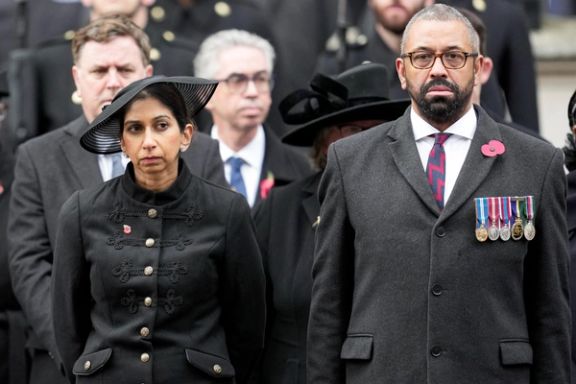
Just weeks ago, now Home Secretary James Cleverly was butting heads with his predecessor Suella Braverman over the contentious issue of designating the IRGC, like its ally, the US, which designated the group in 2019.
Speaking to the Jewish Chronicle in September, Cleverly said that “many of the things that people want” from proscription were “actually being achieved by our sanctions regime” that is already in place.
He added: “We will always keep our options open and we will always act in our country’s best interests.”
In September, Cleverly insisted that “any decision we make on proscription or sanctions is always done with the protection of British nationals and British interests at heart”.
Meanwhile, at least eight IRGC commanders have recently been offered the podium to give talks at British universities, pumping Islamic Republic rhetoric into the minds of young students.